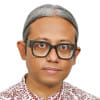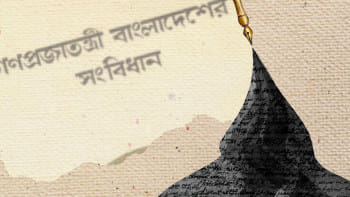What history tells us about election-time government

The joint declaration made by the three political alliances on November 19, 1990, more than 32 years ago, noted: "Every past election held under this government has been marred by vote theft, vote rigging, encroachment of polling stations, looting of ballot boxes, even blatant vote robbery, media coup, and finally, publishing pre-determined results through voterless elections. In this situation, no free and fair election is possible under this government." The statement seems to be taken right from the leaflet of the current opposition parties demanding free and fair election!
In 1990, at the final stage of the anti-dictatorship movement, the Awami League led eight-party alliance, BNP led seven-party alliance, and leftist five-party alliance unitedly expressed the demands and goals of the movement in that declaration, which included free and fair elections; making all state media, including radio-television, independent and autonomous organisations; ensuring free campaigning opportunities for all competing political parties; protection of fundamental rights of the people; ensuring the independence and impartiality of the judiciary; and repealing all laws contrary to fundamental rights.
Have any of these demands and goals been achieved after more than three decades? If not, is it because of the failure, betrayal or ideological crisis of the political forces that came to power later? Or is it because the kind of changes needed in the democratic transformation of Bangladesh was not fully captured in the declaration? Or both?
Fundamentally, these democratic aspirations are in direct conflict with the interests of powerful groups represented by the political forces that have ruled Bangladesh for decades. The ruling political groups and the economic elites are mutually dependent on each other. Democratic process, accountability, independent media, judiciary and election system are dangerous for these booty capitalists. That is why, under the movement's pressure, the alliances made various promises but did not build institutional systems to establish the values after coming to power, because these would act as barriers to their own irregularity, corruption and looting.
In the mass movements of the 80s, in addition to the demands for free and fair elections, economic and political rights of students, workers, farmers, the poor and middle class were also in discussion. But when the movements came to a stage where everything turned into a "one-point demand," other crucial goals went out of focus. And although the joint declaration recognised the desire for democratic and constitutional rule, the reforms necessary for enactment were not addressed. For example, reform of Article 70 of the Constitution, which prohibits a member of the parliament to vote against the party, did not gain importance. In this way, the safeguards through which the economic and political foundation of booty capitalism could be weakened, were not installed.
The result – the military dictatorship collapsed but the "permanent democratic system and way of life" the joint declaration aspired towards has not been realised. Rather, it gave rise to electoral authoritarianism over time. Even though every element of a democratic system – like the parliament, election commission, electoral law, voter list, and regular elections – are present formally, in practice, there is no guarantee of free and fair elections and democratic accountability.
The political programmes of opposition parties are not banned formally, but all kinds of informal obstacles are created through machinations of the administration, law enforcement and ruling party. Throughout the year, opposition party leaders and activists are harassed by law enforcers. Special raids are carried out on the eve of political programmes including elections. Door-to-door searches are conducted to create fear among opposition leaders and activists. Supporters are even driven out from their locality to prevent them from carrying out regular political activities, and fictitious cases, filed over events that never took place, are used to harass them.
Leaders, activists and supporters face various obstacles while going to the announced meeting place of opposition parties. Law enforcers set up checkposts at entry points leading to the rally ground. Social media apps, call list, SMS and photo gallery of people's phones are searched to identify supporters of opposition party workers. Sometimes, public transport is barred from entering the city where a political programme is declared; this is done through law enforcers or transport owners and labour unions affiliated with the ruling party. To implement this, transport organisations call a strike with various demands (undemocratic use of democratic tools). To prevent the activists and supporters from staying near the rally ground in advance, law enforcers carry out special raids and arrests in nearby hotels and messes.
It makes no sense to expect neutrality on election day from a government that conducts anti-democratic activities throughout the year using its institutions. The country's public administration, law enforcement agencies, judiciary, election commission, all have become partisan in such a way that free and fair elections are not possible under the ruling-party government, until the institutions are reformed comprehensively.
Therefore, elections under the ruling government in Bangladesh cannot be justified by arguing that polls are held this way in almost all democratic countries. In countries where free and fair elections are held under the ruling government, the institutions have the structure and culture to work independently.
So first, we need to acknowledge this grim reality, arrange several more elections under a non-partisan government, and while doing so, take necessary steps to reform the Constitution, dismantle institutions' yoke to partisanship, ensure freedom of press and expression, and uproot the monopolistic political power structure based on a predatory economy. If we can successfully accomplish these tasks, the necessity to arrange elections under a separate system will automatically disappear.
Failure to do so will perpetuate the unaccountable power structure. If a government can stay in power disregarding the public opinion, then that government protects vested interests instead of public ones. And as a result, the country's economy falls into crisis and people's livelihood are disrupted. So, the cart cannot be put before the horse: the institutions have to be fixed first, then the provision of a non-partisan system can be removed. The consequences of abolishing the system before fixing democratic institutions have become clear in the last two controversial national elections. Any repetition of this will be disastrous for the country.
Kallol Mustafa is an engineer and writer who focuses on power, energy, environment and development economics.
Views in this article are the author's own.
Follow The Daily Star Opinion on Facebook for the latest opinions, commentaries and analyses by experts and professionals. To contribute your article or letter to The Daily Star Opinion, see our guidelines for submission.

 For all latest news, follow The Daily Star's Google News channel.
For all latest news, follow The Daily Star's Google News channel. 









Comments